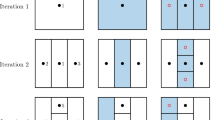Abstract
The satisfiability problem in forms such as maximum satisfiability (MAX-SAT) remains a hard problem. The most successful approaches for solving such problems use a form of systematic tree search. This paper describes the use of a hybrid algorithm, combining genetic algorithms and integer programming branch and bound approaches, to solve MAX-SAT problems. Such problems are formulated as integer programs and solved by a hybrid algorithm implemented within standard mathematical programming software. Computational testing of the algorithm, which mixes heuristic and exact approaches, is described.
Similar content being viewed by others
References
Beasley, J.E. and P.C. Chu. (1996). “A Genetic Algorithm for the Set Covering Problem.” European Journal of Operational Research94,392–404.
Blair, C., R.G. Jeroslow, and J.K. Lowe. (1988). “Some Results and Experiments in Programming Techniques for Propositional Logic.” Computers and Operations Research13,633–645.
Cook, S.A. (1971). “The Complexity of Theorem-Proving Procedures.” in Proceedings of the 3rd Annual ACM Symposium on the Theory of Computing, pp.151–158.
Cotta, C., J.F. Aldana, A.J. Nebro, and J.M. Troya. (1995). “Hybridizing Genetic Algorithms with Branch and BoundTechniques for the Resolution of the TSP. ” InD.W. Pearson, N.C. Steele, and R.F. Albrect (eds.), Artificial Neural Nets and Genetic Algorithms. Proceedings of the International Conference on Artificial Neural Nets and Genetic Algorithms. Ales, France, 1995, pp. 277–280.
Davis, L.D. (1991). Handbook of Genetic Algorithms. Amsterdam: Van Rostrand Reinhold.
Davis, M. and H. Putnam. (1960). “A Computing Procedure for Quantification Theory.” Journal of the ACM 7, 201–215.
De Jong, K.A. and W.M. Spears. (1989). “Using Genetic Algorithms to Solve NP-Complete Problems.” In J.J. Grefenstette (ed.), Proceedings of the 3rd International Genetic Algorithms Conference.New Jersey, USA: Lawrence Erlbaum Associates.
DIMACS software: ftp://dimacs.edu/pub/challenge/satisfiability/contributed/selman/mwff.c
Gent, I.P. and T. Walsh. (1994). “Easy Problems are Sometimes Hard.” Artificial Intelligence 70, 335–345.
Harche, F., J.N. Hooker, and G. Thompson. (1994). “A Computational Study of Satisfiability Algorithms for Propositional Logic.” ORSA Journal on Computing6,423–435.
Holland, J. (1975). Adaption in Natural and Artificial Systems. Michigan: University of Michigan Press.
Hooker, J.N. (1996). “Resolution and the Integrality of Satisfiability Problems.”Mathematical Programming74, 1–10.
Hooker, J.N. and V. Vinay. (1995). “Branching Rules for Satisfiability.” Journal of Automated Reasoning15, 359–383.
Jeroslow, R.G. and J. Wang. (1990). “Solving Propositional Satisfiability Problems.” Annals of Mathematics and Artificial Intelligence1, 167–187.
Land, A.H. and A.G. Doig. (1960). “An Automatic Method for Solving Discrete Programming Problems.” Econometrica28,497–520.
Loveland, D.W. (1978). Automated Theorem Proving: A Logical Basis. Amsterdam: North-Holland.
Nagar, A., S.S. Heragu, and J. Haddock. (1996). “A Combined Branch and Bound and Genetic Algorithm Based for a Flowshop Scheduling Algorithm.” Annals of Operations Research63, 397–414.
Reeves, C.R. (1993). Modern Heuristic Techniques for Combinatorial Problems.Oxford: Blackwell Scientific.
Reeves, C. (1996). “Hybrid Genetic Algorithms for Bin-Packing and Related Problems.” Annals of Operations Research63,371–396.
XPRESS-MP, Dash Associates Ltd., Blisworth, Northamptonshire, England.
Author information
Authors and Affiliations
Rights and permissions
About this article
Cite this article
French, A.P., Robinson, A.C. & Wilson, J.M. Using a Hybrid Genetic-Algorithm/Branch and Bound Approach to Solve Feasibility and Optimization Integer Programming Problems. Journal of Heuristics 7, 551–564 (2001). https://doi.org/10.1023/A:1011921025322
Issue Date:
DOI: https://doi.org/10.1023/A:1011921025322




